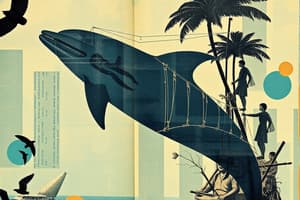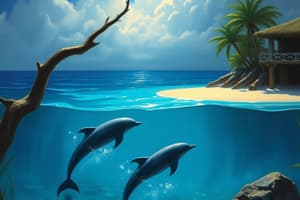Podcast
Questions and Answers
How would you describe Karana's relationship with her brother, Ramo?
How would you describe Karana's relationship with her brother, Ramo?
Karana and her brother have a good relationship. Karana tries to act older and wiser than her brother. She thinks he is easily distracted so she tries to set a good example for him.
Who is Chief Chowig, and how would you describe him?
Who is Chief Chowig, and how would you describe him?
He is the chief of Ghalas-at and the father of Karana and Ramo. He is a smart man who stands up for the rights of his tribe and does what is best for the village.
What do the Aleuts want to do on the island of Ghalas-at?
What do the Aleuts want to do on the island of Ghalas-at?
The Aleuts want to hunt sea otters and camp on the island while they hunt.
What action(s) of Chief Chowig indicates that he is a smart man?
What action(s) of Chief Chowig indicates that he is a smart man?
Why does Chief Chowig warn his people against becoming friends with the Aleuts?
Why does Chief Chowig warn his people against becoming friends with the Aleuts?
Why were the villagers so alert in making sure that the Aleut hunters didn't leave unexpectedly?
Why were the villagers so alert in making sure that the Aleut hunters didn't leave unexpectedly?
What three signs were noted that suggested that the hunters were getting ready to leave the island of Ghalas-at?
What three signs were noted that suggested that the hunters were getting ready to leave the island of Ghalas-at?
How do we know that the Aleuts were also watching the people of Ghalas-at?
How do we know that the Aleuts were also watching the people of Ghalas-at?
What message did Chief Chowig send to the Aleuts when he refused to share the fish with them?
What message did Chief Chowig send to the Aleuts when he refused to share the fish with them?
How does Karana feel about the Aleuts killing so many sea otters?
How does Karana feel about the Aleuts killing so many sea otters?
How might the concluding paragraph of Chapter 3 be regarded as an example of foreshadowing?
How might the concluding paragraph of Chapter 3 be regarded as an example of foreshadowing?
Why do the Aleuts and the people of Ghalas-at fight?
Why do the Aleuts and the people of Ghalas-at fight?
How has Ghalas-at changed after the fight with the Aleuts?
How has Ghalas-at changed after the fight with the Aleuts?
Why does Kimki want to settle the tribe in a new area?
Why does Kimki want to settle the tribe in a new area?
Why does Karana jump off the ship and return to the island?
Why does Karana jump off the ship and return to the island?
What does the excerpt about Karana's feelings for her brother reveal?
What does the excerpt about Karana's feelings for her brother reveal?
In what ways is Karana better prepared than others to handle her situation?
In what ways is Karana better prepared than others to handle her situation?
How does Karana describe the huts as she and her brother return to the village?
How does Karana describe the huts as she and her brother return to the village?
What two things are being compared in the simile about the spit and the ocean?
What two things are being compared in the simile about the spit and the ocean?
What happened to Ramo?
What happened to Ramo?
Describe Karana's response to Ramo's death.
Describe Karana's response to Ramo's death.
What object is personified in the sentence about fog?
What object is personified in the sentence about fog?
What does Karana decide to do to the village of Ghalas-at and why?
What does Karana decide to do to the village of Ghalas-at and why?
Why must Karana make weapons for herself?
Why must Karana make weapons for herself?
What does Karana discover in the chest left behind by the Aleuts?
What does Karana discover in the chest left behind by the Aleuts?
Why did the first storms of winter end Karana's hopes of a ship coming for her?
Why did the first storms of winter end Karana's hopes of a ship coming for her?
What causes Karana to return to the island?
What causes Karana to return to the island?
What decision shows Karana has accepted living on the island?
What decision shows Karana has accepted living on the island?
Why do you think Karana decided to build her house near the sea elephants?
Why do you think Karana decided to build her house near the sea elephants?
How would you describe the mood in Chapter 11?
How would you describe the mood in Chapter 11?
What causes her to seek shelter in the cave originally?
What causes her to seek shelter in the cave originally?
What two reasons are given for the pack of dogs becoming more aggressive?
What two reasons are given for the pack of dogs becoming more aggressive?
Where had the leader of the pack of dogs probably come from?
Where had the leader of the pack of dogs probably come from?
Why does Karana fear the leader of the pack of dogs more than any other member?
Why does Karana fear the leader of the pack of dogs more than any other member?
What indicates that Karana is a compassionate person?
What indicates that Karana is a compassionate person?
Do you think Karana helped the leader of the pack so that she could keep him as a pet?
Do you think Karana helped the leader of the pack so that she could keep him as a pet?
How do Karana's feelings for the dog change at the end of Chapter 15?
How do Karana's feelings for the dog change at the end of Chapter 15?
What does Karana name the dog and what does it mean in her language?
What does Karana name the dog and what does it mean in her language?
Flashcards are hidden until you start studying
Study Notes
Relationship Between Karana and Ramo
- Karana acts as a role model for her younger brother Ramo, trying to guide him with her maturity.
- Karana perceives Ramo as easily distracted and makes efforts to set a positive example.
Chief Chowig
- Chief Chowig serves as the leader of Ghalas-at and father to Karana and Ramo.
- He is depicted as wise and protective, advocating for his tribe's rights against external threats.
Aleuts' Intentions
- The Aleuts aim to hunt sea otter and camp on Ghalas-at during their activities.
- Captain Orlov commands the Aleut group.
Chief Chowig's Wisdom
- He recalls past encounters with the Aleuts and insists on equitable shares of the captured otters, highlighting his leadership skills.
Distrust of the Aleuts
- Chief Chowig expresses concern that the Aleuts lack understanding of friendship, recounting previous conflicts with them.
- This distrust reflects a protective stance for the people of Ghalas-at.
Villagers' Vigilance
- The villagers remain alert to ensure that the Aleuts adhere to their agreements, demonstrating a communal sense of duty.
Signs of Aleuts' Departure
- Indicators of the Aleuts preparing to leave include filled ships with otter pelts, intense skinning work, and visible preparations at their camp.
Aleuts' Observational Skills
- The Aleuts are aware of the fishing success of Ghalas-at, demonstrating their cautious monitoring of the villagers.
Message from Chief Chowig
- By denying the Aleuts fish, Chief Chowig signals a desire for distance and independence, hinting at possible anger or retaliation from the Aleuts.
Karana's Sentiments on Sea Otter Hunting
- Karana expresses anger and sadness over the Aleuts' excessive hunting, feeling a deep connection to the otters she considers friends.
Foreshadowing in the Narrative
- The concluding paragraph of Chapter 3 suggests an impending conflict, with Chief Chowig preparing weapons amidst rising tensions.
Conflict with Aleuts
- A dispute arises between the Aleuts and the villagers over hunting agreements, resulting in significant casualties, including Chief Chowig.
Changes in Ghalas-at Post-Fight
- After the conflict, 15 out of the original 42 men survive; a new leader, Kimki, rises and decides to seek a new settlement for the tribe.
Kimki's Leadership
- Kimki's decision to relocate stems from painful memories tied to the village; he employs white men to assist in relocating the villagers.
Ramo's Fate
- Karana returns to the island to find Ramo has not boarded the ship, leading to her emotional response and desire to protect him.
Karana's Love for Ramo
- Karana's deep affection for Ramo is illustrated by her instinct to hold him and comfort him upon their reunion.
Karana's Preparedness
- Karana's island survival skills, such as hunting, contrast with modern technology which would enhance one’s ability to cope with isolation.
Description of the Huts
- Karana likens the deserted huts to ghosts, conveying a sense of silence and haunting memories from her past.
Simile in Chapter 8
- The simile compares a land formation to a fishhook, emphasizing the interconnectedness of nature.
Ramo's Death
- Ramo meets a tragic end at the jaws of wild dogs, drastically altering Karana's world.
Karana's Grief
- In response to Ramo's death, Karana vows revenge against the dogs, showcasing her emotional turmoil and desire for justice.
Personification of Fog
- Fog is described as creeping in, attributing human-like movement to a natural phenomenon, enhancing the setting's atmosphere.
Karana's Decisions
- To cope with memories of her past, Karana burns the village huts, indicating a desire to erase painful reminders.
Crafting Weapons
- Despite cultural prohibitions against women making weapons, Karana prioritizes her safety and protection from wild dogs.
Discarding Aleut Beads
- Karana discards the Aleut beads, recognizing them as symbols of loss and betrayal from her tribe's recent history.
Change in Seasons
- With winter approaching, Karana realizes the unlikelihood of rescue and decides to venture eastward using a canoe.
Acceptance of Island Life
- Karana demonstrates her acceptance of solitary living by beginning to build her own house on the island.
Mood Shift in Chapter 11
- Contrary to previous chapters filled with longing for rescue, Chapter 11 depicts Karana's acceptance of her life as part of the island.
Seeking Shelter in a Cave
- Faced with danger from wild dogs, Karana smartly finds refuge in a cave, highlighting her adaptability and survival instincts.
Aggressive Dog Pack
- The increase in aggressive behavior among the dog pack is attributed to new members joining from slain villagers and the emergence of a strong leader.
Leader of the Dog Pack
- The pack's leader likely originates from the Aleut group, establishing a link to past conflicts.
Karana's Fear of the Leader
- Karana's strategic conservation of arrows for the pack leader reflects her recognition of the specific threat he poses.
Compassionate Actions
- Karana’s decision to spare an injured dog exemplifies her inherent compassion, contrasting with her vow of revenge.
Relationship with the Dog
- While initially indifferent, Karana’s feelings evolve as she begins to care for the injured leader of the pack, indicating her capacity for empathy.
Naming the Dog
- Karana names the dog "Ronto," which translates to "fox eyes" in her language, signifying a newfound bond despite her earlier hostility.
Studying That Suits You
Use AI to generate personalized quizzes and flashcards to suit your learning preferences.




